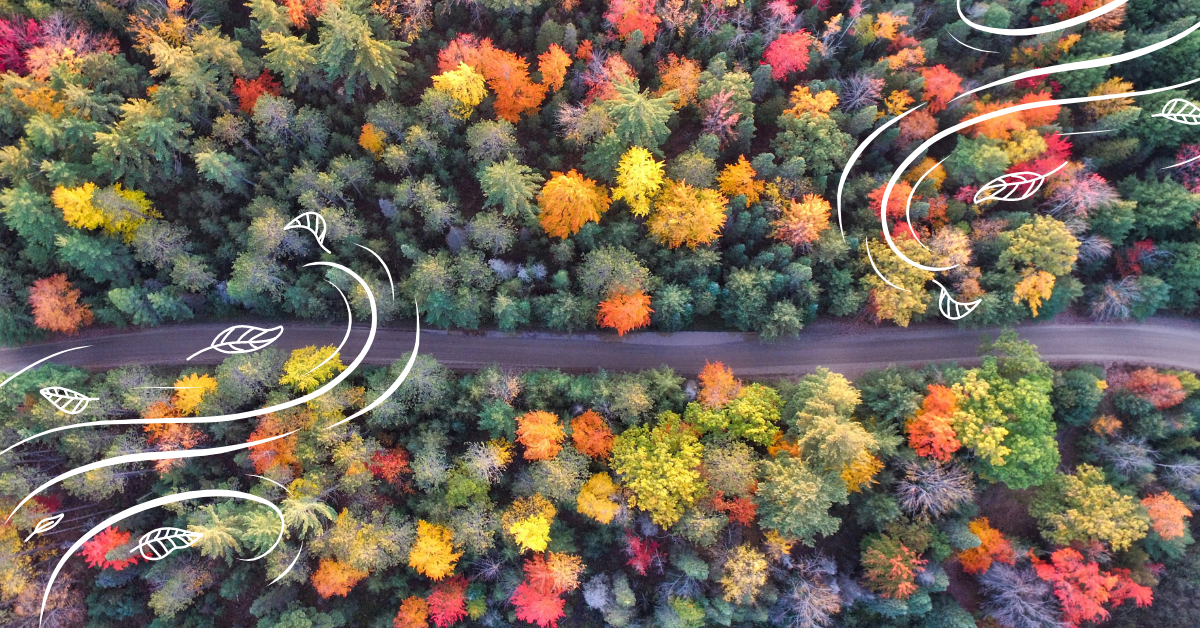by Priscilla Feral
In New York State and New England, deciduous tree’s peak foliage and leaf fall dates occur from early October to mid-November. Some of the best times to visit for fall foliage follow warm, sunny days and cool nights that prompt leaves to change color and fall by breaking down the chlorophyll in leaves. Meanwhile, trees fueled by the sun’s energy prepare to hibernate and shut down their sugar-making activity.
In the Northeast, it’s upstate New York this year that’s expected to have the most stunning displays of fall leaves—bright reds and vibrant oranges. After that extravagant experience, leaves are either seen as a natural mulch full of nutrients, and important to enrich the soil, or a nuisance to be hauled away.
Friends of Animals knows that one way to reduce greenhouse gases and benefit ecosystems is to leave the leaves, mulched or not, to decompose. Pollinators like butterflies, other insects, and wildlife like lizards, turtles, and frogs need leaves on the ground to survive the winter.
If you must clear some leaves, electric leaf blowers are better for the environment—quieter and their use doesn’t spew pollution.
Let the debate on dirty air begin.
A single car must travel 1,100 miles to produce the same amount of smog as a commercial gas-powered leaf blower. That’s the reason why three Connecticut cities and towns have restricted hours on using gas-engine leaf blowers, or banned them. California banned the sale of gas-powered leaf blowers and weed whackers this year. The California legislature also allocated $30 million in incentives for individuals and landscapers to make the switch to zero-emission lawn equipment. Other bans occur in Miami Beach, Fla., Washington, D.C., Seattle, Wash., and Portland, Ore.
Invested in noisy gas-powered leaf blowers, landscapers claim there’s a need to blow grass clippings (and pesticide debris) every week to remove every leaf in the fall, yet these blowers are a major source of noise and air pollution. An EPA report reveals that 2-stroke engines, the kind found in gas-powered leaf blowers and garden equipment are responsible for so much carbon dioxide, they contribute to climate change. Ten percent of all air pollution is emitted through gasoline-driven lawn care.
There are an estimated 11 million leaf blowers nationally, and most landscapers argue that switching to raking leaves or using electric equipment costs too much. While electric lawn equipment sometimes has a higher initial price tag, it saves money over time due to lower operating costs.
“Homeowners hiring electric lawn-care providers can expect similar prices to traditional gas-based lawn care with less noise, zero noxious emissions and no gasoline spills during refills, which
annually account for more than the 11 million gallons of crude spilled in the Exxon Valdez disaster,” says Dan Delventhal of MowGreen in Fairfield County, CT, who in 2006 became one of the first landscapers in the country to go all electric.
There’s a climate crisis, an air pollution crisis, and Friends of Animals supports any and all bans on hyper-polluting gas-powered leaf blowers. Lawn care doesn’t have to pollute the air or deafen our ears. For us, to protect the planet and all wildlife who call it home, air quality is the priority.
Take action: How to make the switch to sustainable lawn care
For homeowners with large yards, less time or physical limitations, know that there are likely to be several companies in your area that offer electric lawn maintenance services.
Stephen Gault, founder and CEO of Eco Mow, an all-electric lawn-care company in Dallas, advises to search online for local companies using keyword phrases such as: “electric lawn service near me,” “all electric lawn service,” or “electric lawn mowing service.” You may also want to check out www.plowzandmowz.com/electric-lawn-mowing, an app that allows you to connect with electrical equipment manufacturers and environmentally conscious lawn-mowing services in your area and get a free quote.
To help eco-minded homeowners in the leafy Northeast U.S., Friends of Animals is compiling a state-by-state listing of all-electric lawn-care companies. Among those listed are service locations of Clean Air Lawn Care, a nationwide franchise that offers zero-emission and solar-powered mowing, trimming, and blowing.
And last, but not least, to reduce 10 percent of U.S. air pollution while benefiting your lungs, trees, gardens and plants, we should consider leaving the leaves, mulched or not, to decompose.

